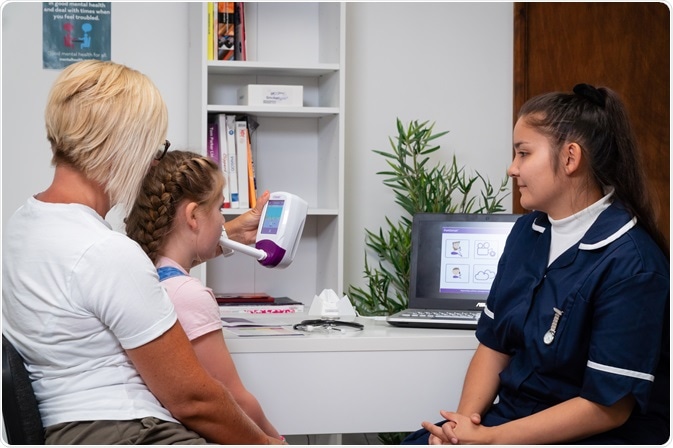The Problem with Diagnosing Asthma
Approximately 339 million people around the world are afflicted with asthma, with asthma-related mortality affecting the lives of three families each day. Staggeringly, around two-thirds of these deaths are avoidable. Insufficient treatment, inadequate management and diagnostic issues each contribute to asthma related mortality. Even today, up to 30% of asthma patients are wrongly diagnosed, not receiving the care they require to manage their disorder as a consequence.

Image credit: Bedfont Scientific
In the UK, where someone is admitted to hospital every eight minutes because of asthma related problems, unsafe prescribing practices put more than 120,000 asthma patients at increased risk of a life-threatening attack. Asthma diagnosis can be highly difficult in some instances, particularly as the symptoms of multiple diseases manifest themselves in a similar way to those of asthma.
Typical diagnostic methodologies, such as peak flow and spirometry, yield insufficient insight, as many of these techniques merely assess airflow, rather than airway inflammation. The absence of a diagnostic inflammation evaluation is a major contributor to misdiagnosis in the patient population.
Using FeNO to Diagnose Asthma
Over the last ten years, a number of scientific breakthroughs, particularly relating to biomarkers contained in the exhaled breath, have significantly developed the understanding of asthma. Fractional exhaled nitric oxide (FeNO) in exhaled breath represents one objective biomarker assessment that can detect asthma patients who are more likely to benefit from corticosteroids.
Nitric oxide is generated naturally in the lungs to counter inflammation in the airway, following which it is exhaled. Asthma is denoted by inflammation of the airways and so identifying airway inflammation, as well as assessing an asthmatic’s response to treatment, make effective management of the disorder easier.
FeNO has been proven to be a risk-free, reliable (in accordance with both animal and human studies) and complementary objective method for the quantification of airway inflammation, specifically for asthma patients. FeNO is especially helpful in the evaluation of airway inflammation to differentiate between asthma sufferers and those with allergen-induced airway inflammation, without airway hyper-reactivity. Moreover, it can also assist in the identification of patients with antigen-specific T-helper cells type 2, type 2 allergic and eosinophilic inflammation.
By clearly separating and accurately diagnosing patients with equivalent symptoms, the optimal course of treatment can be prescribed more efficiently. This minimizes the time required to a finalize diagnosis, reduces over-prescription of medication, and safeguards patient safety.
FeNO for Asthma Monitoring
Alongside asthma diagnosis, FeNO measurements also benefit the long-term administration of asthmatic symptoms. Regular FeNO assessment can detect patients’ adherence to treatment, while it also represents a useful, non-invasive, adjunctive technique to determine the quality of asthma control in steroid-naïve asthmatics, as well as for asthmatics receiving treatment.
This enables healthcare professionals to calibrate corticosteroid dosage according to the inflammation levels and patient feedback. Recording FeNO levels can also help to identify patients who are candidates for biologic treatment, and possibly even identify patients as candidates for future treatments.
Implementing FeNO Testing
While some medical professionals have been reluctant to utilize FeNO measurements after its introduction into the NICE guidelines, its adoption might permit faster and more precise diagnosis, while simultaneously optimizing treatment outcomes.
Evaluations can be made from a single test, with positive diagnosis being marked by FeNO levels over the NICE recommended guideline of ≥40 parts per billion. The test is fast, totally non-invasive, and suitable for both adults and children. Consequently, it is characterized by high levels of patient compliance.
The NObreath® FENO Breath Test Monitor from Bedfont Scientific
Since 1976, Bedfont Scientific has engineered and manufactured exhaled breath and gas monitoring apparatus. Bedfont Scientific’s NObreath® FENO Breath Test Monitor calculates FeNO levels safely and accurately, conforming to ERS/ATS guidelines, and having been clinically tested for precision.
Until recently, FeNO testing has been too expensive to undertake in routine clinical practice. However, medical technology advancements, including those enabled by Bedfont Scientific produced devices, have since permitted the development of validated, affordable testing of FeNO in patients with asthma or suspected asthma.
The NObreath® FeNO Breath Test Monitor is a portable device that needs just an inhale and an exhale to assess FeNO levels. Offering unlimited FeNO testing, with in-built profiles for both adults and children, the NObreath® monitor is an affordable, simple and reliable solution yielding accurate results.
References
- Global Asthma Report 2018
- https://www.asthmaandlung.org.uk/media/press-releases
- http://www.nationalhealthexecutive.com/Health-Care-News/over-one-million-adults-may-be-misdiagnosed-with-asthma--nice-
- https://www.asthmaandlung.org.uk/sites/default/files/2023-03/nrad-one-year-on.pdf
- Asthma UK annual survey 2017
- https://www.nice.org.uk/guidance/ng80/documents/short-version-of-draft-guideline
- https://www.ncbi.nlm.nih.gov/pmc/articles/PMC5351354/
- https://www.ncbi.nlm.nih.gov/pubmed/14644933
- http://www.tandfonline.com/doi/full/10.1080/17476348.2017.1236688
About Bedfont Scientific
Bedfont® Scientific has specialised in the design and manufacture of exhaled breath and gas monitoring instruments since 1976.
For medical gas monitoring, their Medi-Gas Check medical pipeline testing range verifies not only the quantity but also quality of gas administered to patients.
Bedfont's breath analysers include carbon monoxide (CO) monitors such as the Smokerlyzer®, used for smoking cessation, and the ToxCO®, used by emergency services, to diagnose CO poisoning.
The NObreath® FeNO monitor provides accurate analysis of airway inflammation for the control of asthma, and the Gastrolyzer® range aids in the detection of gastrointestinal disorders and food intolerances. Quick and non-invasive, breath analysis is the new blood test.
Sponsored Content Policy: News-Medical.net publishes articles and related content that may be derived from sources where we have existing commercial relationships, provided such content adds value to the core editorial ethos of News-Medical.Net which is to educate and inform site visitors interested in medical research, science, medical devices and treatments.